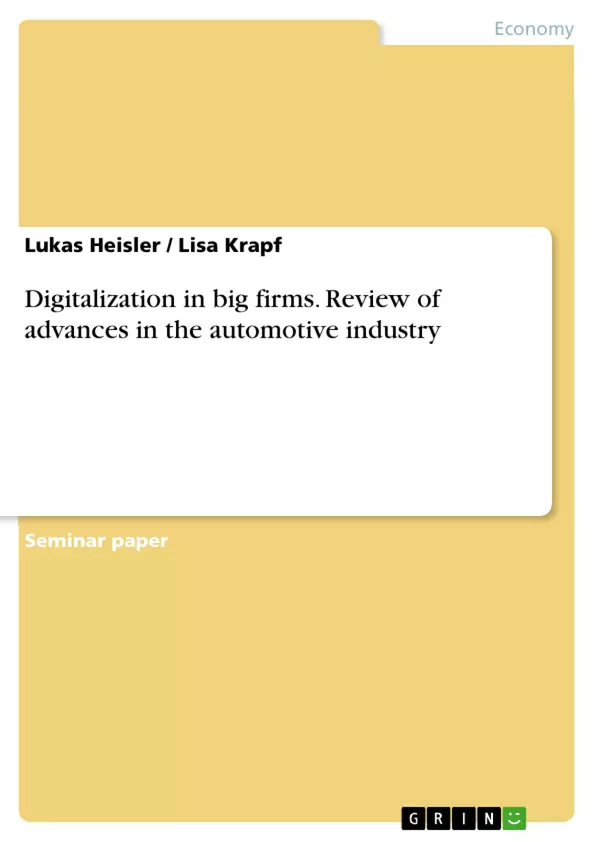Using technologies like social media, e-commerce, big data and analytics, cloud computing, mobility and broadband connectivity or the Internet of Things, the world economy is transforming into a digital economy. With more than 28,1 Billion connected devices by 2020, our World has never been this connected. For the automotive industry this means that
it´s their task to adapt and stay relevant in this environment. The focus will be on new thinking, flexibility and speed.
Inhaltsverzeichnis (Table of Contents)
- Introduction
- Market Trends
- Digital Enterprise
- Marketing
- Social Media Marketing
- Sales
- Online vehicle sales and vehicle configurators
- Virtual reality at dealers or showrooms
- Agile Project Methods
- Design Thinking
- Scrum
- Human Resources
- New jobs
- Chief Digital Officer
- Digital Manufacturing
- Industry 4.0
- Internet of Things
- Connected Supply Chain
- Robotics
- IT-Security
- Conclusion
- View in the future of automotive industry
Zielsetzung und Themenschwerpunkte (Objectives and Key Themes)
This paper explores the impact of digitalization on the automotive industry, specifically focusing on how large companies are adapting their business strategies and models to this evolving landscape. It examines the key aspects of digital transformation within the automotive industry, including marketing, sales, project management, human resources, and manufacturing.
- The impact of global trends, including urbanization, population dynamics, and increased connectivity, on the automotive industry.
- The role of digital marketing strategies, especially social media, in reaching and engaging customers.
- The emergence of new sales models, such as online vehicle sales and virtual reality showrooms, within the automotive industry.
- The adoption of agile project management methods, like Design Thinking and Scrum, to improve innovation and efficiency.
- The transformation of manufacturing processes through Industry 4.0, the Internet of Things, and robotics.
Zusammenfassung der Kapitel (Chapter Summaries)
The initial chapter delves into the global trends that are driving the digitalization process. It discusses the impact of urbanization, global population dynamics, and the increasing connectivity of the world. The paper argues that these trends are shaping the automotive industry, demanding adaptability and innovation from companies in order to stay relevant.
The subsequent chapter focuses on the digital enterprise, examining the ways in which large automotive firms are transforming their operations. The chapter specifically explores the impact of digitalization on marketing, sales, agile project methods, human resources, and digital manufacturing. It highlights the use of social media platforms, online sales channels, and agile methodologies in this context.
Schlüsselwörter (Keywords)
The core themes and concepts explored in this paper include digital transformation, automotive industry, business strategy, digital business models, global trends, urbanization, connectivity, digital marketing, social media, online sales, agile project management, human resources, digital manufacturing, Industry 4.0, Internet of Things, and robotics.
Frequently Asked Questions
How is digitalization transforming the automotive industry?
Digitalization is shifting the focus toward connectivity, big data, and cloud computing. Companies are adapting by implementing new digital business models in sales, marketing, and manufacturing.
What role does social media play in digital marketing for car firms?
Social media marketing is crucial for reaching modern consumers, allowing brands to engage directly with audiences and build digital communities around their products.
What are the new trends in vehicle sales?
Trends include online vehicle sales, digital configurators, and the use of virtual reality in showrooms to enhance the customer experience without physical inventory.
How do Industry 4.0 and IoT impact automotive manufacturing?
Industry 4.0 and the Internet of Things (IoT) enable a connected supply chain, increased use of robotics, and improved IT security, leading to more efficient and flexible production.
What agile methods are being adopted by automotive companies?
Large firms are increasingly using agile project methods like Design Thinking and Scrum to increase speed, flexibility, and innovation in product development.
- Quote paper
- Lukas Heisler (Author), Lisa Krapf (Author), 2018, Digitalization in big firms. Review of advances in the automotive industry, Munich, GRIN Verlag, https://www.grin.com/document/430736



